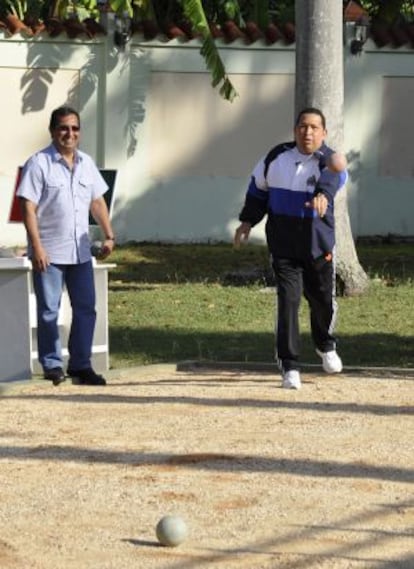Chávez phones home to quash rumors
Army general's murder and judge's cooperation with DEA rattle Venezuela

After nine days of silence and amid swelling rumors about the seriousness of his cancer, Venezuelan President Hugo Chávez phoned home on Monday from Cuba, sounding healthy and telling reporters who were invited to speak with him that he plans on returning home later in the week.
Chávez said that his followers are accustomed to living with an avalanche of rumors about his health, "because they come from the dirty war laboratories, which are psychologically operating day and night throughout different parts of the country." Among the stories doing the rounds on social networks such as Twitter and Facebook were reports that the fiery leftist leader won't be able to run for re-election in October, and even that he had died in Cuba.
Chávez said the reports came from "the bourgeoisie" and "right-wing" elements. The president's reappearance came as members of his government were busy denying stories about his health problems. Speculation had heightened because Chávez had not been seen or heard from since April 13, when he traveled to Cuba for further treatment. He also missed the Summit of the Americas in Colombia.
Nelson Bocaranda, the journalist who has been accurately informing on the president's condition in his newspaper column and webpage, said that Saturday "was the worst day for HCF since June 2001," when he discovered he had a cancerous tumor. Citing sources close to the president, Bocaranda said that Chávez had "learned the true extent of his cancer," but did not explain whether it was good or bad news. The government insists that Chávez is doing well as he continues with his radiation and chemotherapy schedules in Havana. Caracas has released a photograph of him posing with his family and playing bolas criollas, a popular Venezuelan ball game.
According to polls, Chávez has a 20-point lead over opposition candidate Henrique Capriles Radonski. But Bocaranda blamed the government for allowing the rumors to fly in an effort to turn the public's attention away from two recent scandals that have rocked Chávez's government.
First, a former Supreme Court justice, who was kicked off the bench in late March for his alleged ties to notorious drug trafficker Walid Makled, is cooperating with the US Drug Enforcement Administration in Washington. Eladio Aponte Aponte has named a host of top government officials as being involved in the drug trade, including Defense Minister Henry Rangel Silva and army general Clíver Alcalá Cordones. Aponte has reportedly taken with him hundreds of documents that contain sensitive information.
The general's family believe he was murdered because he knew too much
"That man is a delinquent," Chávez said on Monday.
While Chávez has tried to discredit Aponte, including issuing an international arrest warrant for him on Friday, another event has also taken the country by surprise. On April 19, a top army general, close to Chávez, was ambushed in Barcelona, Anzoátegui state, leading his family to believe that he was murdered because he knew too much about criminal activities taking place within the government.
General Wilmer Antonio Moreno was attacked while he was driving home by armed men who fired at least 10 shots at him after asking his name. His son, also named Wilmer Moreno, wrote on his Twitter account: "I love you, Dad. The banner of truth and honesty will never hide what you knew. I will make sure of that."
Anzoátegui governor Tarek William Saab asked prosecutors to conduct a full investigation, calling it "a strange case."
Bocaranda says that military officials have told him through intermediaries that they won't accept a civilian becoming Chávez's successor if the president cannot run in October. Observers in Venezuela have said that Foreign Minister Nicolás Maduro is already grooming himself to become vice president and to take over the Venezuelan United Socialist Party PSUV candidacy.
Opposition officials in Venezuela have speculated that there is a plan in place for "a revolutionary emergency" should Chávez be unable to run, with military factions ready to take part in the race.
Tu suscripción se está usando en otro dispositivo
¿Quieres añadir otro usuario a tu suscripción?
Si continúas leyendo en este dispositivo, no se podrá leer en el otro.
FlechaTu suscripción se está usando en otro dispositivo y solo puedes acceder a EL PAÍS desde un dispositivo a la vez.
Si quieres compartir tu cuenta, cambia tu suscripción a la modalidad Premium, así podrás añadir otro usuario. Cada uno accederá con su propia cuenta de email, lo que os permitirá personalizar vuestra experiencia en EL PAÍS.
¿Tienes una suscripción de empresa? Accede aquí para contratar más cuentas.
En el caso de no saber quién está usando tu cuenta, te recomendamos cambiar tu contraseña aquí.
Si decides continuar compartiendo tu cuenta, este mensaje se mostrará en tu dispositivo y en el de la otra persona que está usando tu cuenta de forma indefinida, afectando a tu experiencia de lectura. Puedes consultar aquí los términos y condiciones de la suscripción digital.








































